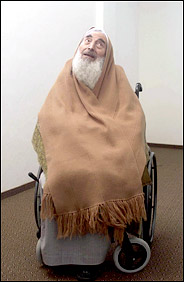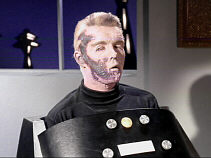View current page
...more recent posts
One More Half-Truth for the Road
Former White House Press Secretary Ari Fleischer has a letter in the New York Times today, attempting to set the record straight on a creepy statement he made in the immediate aftermath of 9/11/01. Read it carefully:
In "Lifting the Shroud" (column, March 23), Paul Krugman alleges that at my White House press briefing on Sept. 26, 2001, I "ominously warned" Americans to "watch what they say, watch what they do." He accuses me of telling citizens "to accept the administration's version of events, not ask awkward questions.""They're reminders"--meaning both the statement by the racist congressman and the Maher statement. Nice try, Ari.At that briefing two weeks after Sept. 11, I was asked about a racist comment made by a Republican congressman from Louisiana who said that if he saw a Sikh-American with a towel wrapped around his head, he would tell the Sikh to get out of his state.
I said, "It's important for all Americans to remember the traditions of our country that make us so strong and so free, our tolerance and openness and acceptance." The president, I said, was disturbed by Representative John Cooksey's remarks.
Moments later, I was asked about Bill Maher's statement that the members of our armed forces who fire missiles are cowards while terrorists who crashed planes into buildings are not cowards.
I answered: "It's a terrible thing to say, and it's unfortunate. And that's why — there was an earlier question about has the president said anything to people in his own party — they're reminders to all Americans that they need to watch what they say, watch what they do."
My remarks urged tolerance and openness and were addressed to those who made statements and threatened actions against Muslims or Sikhs in America.
ARI FLEISCHER
Washington, March 23, 2004
The writer was White House press secretary from 2001 to 2003.
UPDATE: To make his argument work, even though it doesn't, Fleischer also has to paraphrase Maher's comments. Here's an excerpt from an article giving the context of what Maher said:
Of course, all this was said before President Bush put soldiers in harm's way with an unnecessary land war--forcing them to prove their courage on the ground. The article doesn't mention that Maher groveled to try to save the show, or that there was another prominent dissenter--Susan Sontag--who got slimed around the same time.In the weeks after September 11, critics wondered how late-night talk shows would change. Predictably, Leno and Letterman told fewer and safer jokes, mostly at the expense of easy targets like the Taliban and Osama bin Laden. The Daily Show's Jon Stewart was so shaken he cried. But Politically Incorrect, true to form, crashed the somber late-night party. Appearing on Sept. 17 for the first show since the attacks, Maher made it starkly clear his show would live up to its name.
"I do not relinquish - nor should any of you - the right to criticize, even as we support, our government," Maher said. "This is still a democracy and they're still politicians, so we need to let our government know that we can't afford a lot of things that we used to be able to afford. Like a missile shield that will never work for an enemy that doesn't exist. We can't afford to be fighting wrong and silly wars. The cold war. The drug war. The culture war."
What Maher said later in the show, however, is what made headlines. Panelist Dinesh D'Souza [a young conservative --ed.] mentioned that he didn't think the terrorists were "cowards," as George Bush had described them. Maher replied: "We have been the cowards. Lobbing cruise missiles from two thousand miles away. That's cowardly. Staying in the airplane when it hits the building. Say what you want about it. Not cowardly. You're right."
Res Ipsa Loquitur
While I'm getting a bagel this morning I see a photo of Secretary of Defense Donald Rumsfeld on the front page of a local newspaper, testifying before Congress. His hands are raised in a weird gesture, half-imploring, half balling his fists, his mouth a rictus of mock-agony. "Even if bin Laden had been captured or killed in the weeks before 9/11, no one I know believes it could have prevented 9/11," the caption has him saying. The same day, President Bush said, "Had my administration had any information that terrorists were going to attack New York City on September the 11th, we would have acted." These statements make 9/11 sound like an inevitability, a work of subtle genius that no one could have stopped or anticipated.
But think about it--how subtle was it, really? 19 terrorists pass airport security, four planes are hijacked from three different locations, three planes reach their targets, one of which is the military command center of the United States. No fighter jets intervene during their copious flight time. In law, there is an expression "res ipsa loquitur" (the thing speaks for itself), as when a surgeon sews up a sponge inside someone's body after operating. Meaning, this is the type of thing that would never happen absent negligence. 9/11 is one of those events. And yet no one, not one person, has been fired. The dissemblers in the Administration think if they refer to it often enough as an unpreventable, act of God-like event, people will be worn down and start to disbelieve their own common sense about it.

Speaking of the Middle East and Star Trek, the picture above of the late, soon-to-be-blown-away Sheik Yassin (from the New York Times, looking much like a waxwork from Madame Tussaud's) made me think of Captain Pike:

Which reminded me to look for a cybertheory essay I read years ago, by Alan Shapiro, called "Captain Kirk Was Never the Original." Lo and behold, I found it, and commend it to your reading. In a nutshell, Shapiro contrasts Kirk's Cartesian man of action with Pike's traveler in virtual reality, suggesting that we "read Star Trek against Star Trek" rather than dismiss it, as many theorists do, as a relic of pre-digital consciousness. Here's a good excerpt:
The successful media product model has as prerequisite a mythical moment of transcendent creativity which clears the way for the emergence of a new spectacle object. The spectacle object (celebrity, consumer gadget, media property) then enters the panoply of fetishes among which we shop in our efforts to find an identity "niche" and dubiously distinguish ourselves from others. The model serves as lightning rod for ambivalent collective projections, allowing each individual to feel unique at the very moment when all consumers of that same niche are imitating the same elevated pattern.And another cool passage:
But the fully achieved simulacra of virtual reality threaten the stability and profitability of this system of differences. This is why Captain Pike, who was too far ahead of his time, had to be shunted aside in favor of the valorous Captain Kirk.
So Pike, the true first-born, was whisked away into virtual reality and replaced by the changeling Kirk. There was, of course, another way forward for Captain Pike, but the screenwriters of "The Menagerie" were unfortunately ignorant of the basics of writing operating systems software drivers for peripheral devices. Since Pike's bio-rehabilitation programmers had succeeded in resuscitating at least one controllable nerve impulse from his consciousness, and connecting the discrete signals of this impulse across the synaptic gap to an output device (the beeping for "yes" or "no"), further layers of software to drive more sophisticated output devices and sound cards would certainly be possible. From the single binary registering of a 0 or a 1, an entire operational language (a full digital communication) can be devised. One merely has to enumerate and combine varied sequences of 0s and 1s as discrete identifiers in an infinitely permutated system. The only drawback would be that Pike's consciousness itself would always remain at the level of the lowest machine language, forced to perpetually master and will the lengthy binary sequences in order to express himself! He would literally be the machine and its finally awakened artificial intelligence.
